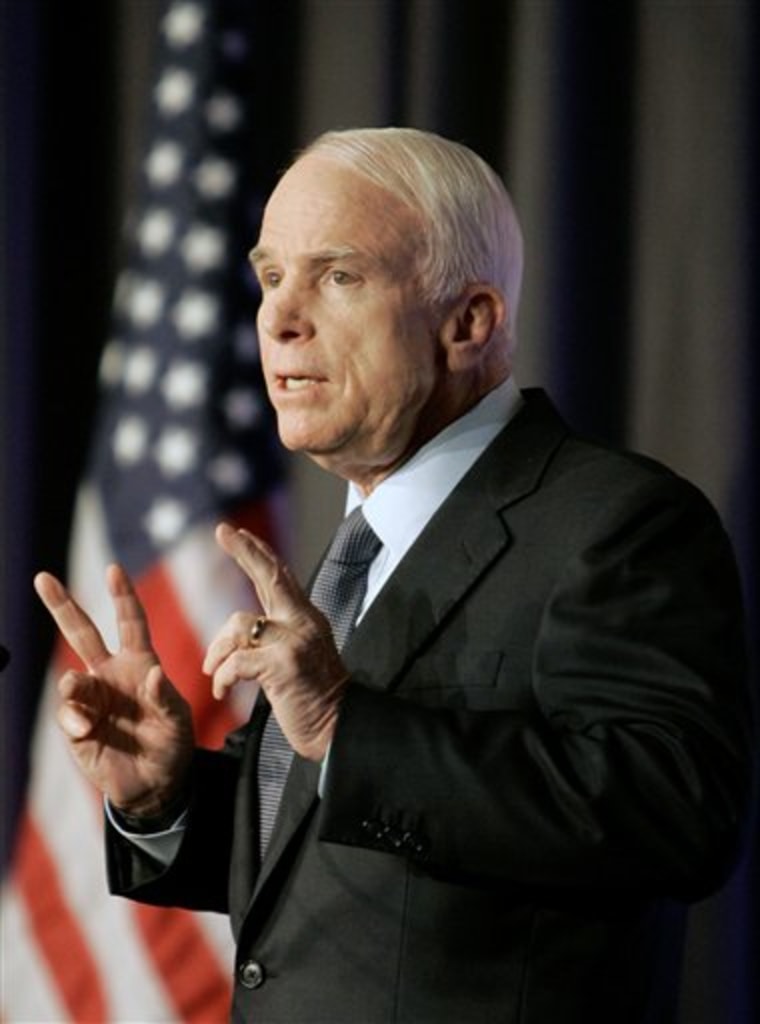Whether you look at the averages of all the major national polls on realclearpolitics.com or pollster.com's trend estimates based on most recent polling, presumptive Republican nominee Sen. John McCain of Arizona very narrowly trails Democratic Sens. Barack Obama of Illinois and Hillary Rodham Clinton of New York by 2 to 3 points.
The fact that there is minimal overall difference between Obama and McCain and Clinton and McCain suggests some stability in the numbers. The closeness of the gap suggests an election consistent with the last two. The 2000 election came down to a 537-vote margin in Florida out of almost 6 million votes cast, and 2004 was decided in Ohio, where there was a difference of just 118,599 out of almost 5.6 million votes cast.
Add in that Democrats need to win the popular vote nationwide by somewhere between a half point and 1.5 points to overcome the more efficient allocation of Republican electoral votes (Republicans only "waste" a lot of extra votes in Texas; Democrats do it in California, Illinois and New York) and that points to a particularly close fall general election.
A new survey conducted for National Public Radio by two of the most respected Democratic and Republican pollsters in the business does a great job of setting the stage for a fascinating election. The survey, conducted by Democrat Stan Greenberg of Greenberg Quinlan Rosner Research and Republican Glen Bolger of Public Opinion Strategies, portrays a very sour electorate, with just 16 percent saying the country was headed in the right direction and a whopping 80 percent saying it was off on the wrong track. In January, right direction was at 23 percent, wrong track at 68 percent.
President Bush's 33 percent job approval rating was no surprise, but only 12 percent strongly approved his performance, while a jaw-dropping 51 percent strongly disapproved his handling of the job.
Congress' overall approval numbers were worse, with 23 percent approving and 73 percent disapproving. Only 3 percent strongly approved, while 44 percent strongly disapproved.
But, the interesting thing is there is virtually no difference in the view of Congress between Republicans, Democrats and independents. Among Republicans, 23 percent approved, 74 percent disapproved; among Democrats 22 percent approved, 72 percent disapproved; among independents, 20 percent approved, 77 percent disapproved.
In the presidential race, Obama led McCain 48 percent to 43 percent. Against Clinton, McCain had 46 percent to her 45 percent, well within the poll's 3.5-point error margin. The difference largely came among independent voters. In this poll, McCain ran much stronger than Clinton among independents, 48 percent to 36 percent, but trailed Obama among the same group, getting 37 percent to Obama's 44 percent.
The survey of 800 likely voters, conducted May 7-10, pointed clearly to several of McCain's weak spots. Asked which candidate would do the best job of handling the economy, the problem the survey had identified as most important to voters, Obama edged McCain by 4 points, 47 to 43 percent; Clinton beat McCain by 8 points, 48 to 40 percent.
When asked whether each candidate has a plan to fix the economy, 45 percent of voters thought McCain did have a plan, while 46 percent said he did not. For Obama, 57 percent said he did, 36 percent said he did not and 59 percent thought Clinton had a plan, while 36 percent said she did not.
On handling the mortgage foreclosure crisis, 38 percent thought Clinton had a plan to deal with it and 34 percent thought Obama had a plan, but just 23 percent said McCain did.
On the question of which "does or does not have a plan to lower gas prices," another white-hot voter concern, 42 percent said Clinton had a plan, 34 percent thought Obama had a plan, just 25 percent thought McCain did.
How about having a plan to "keep healthcare costs under control?" Fifty-nine percent thought Clinton had a plan, 52 percent thought Obama had a plan and just 32 percent thought McCain had a plan.
What about who does or does not "have a plan to make America's economy more competitive?" Fifty-two percent said Clinton had a plan, 50 percent thought Obama had a plan but just 41 percent thought McCain did.
Finally, what about the age-old Republican strength — taxes? When asked which candidate does or does not have a plan "to provide tax relief for the middle class, 50 percent thought Obama had a plan, 49 percent thought Clinton had a plan, but just 31 percent thought McCain had a plan.
Looking at these numbers, one could legitimately conclude that the only reason McCain is keeping this race competitive at all is the national security issue, that on bread-and-butter domestic concerns he's getting clobbered even on his party's traditional strength — taxes.
